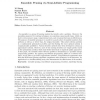2045 search results - page 158 / 409 » Learning programming with Erlang |
116
click to vote
JMLR
2006
15 years 2 months ago
2006
An ensemble is a group of learning models that jointly solve a problem. However, the ensembles generated by existing techniques are sometimes unnecessarily large, which can lead t...
HICSS
2009
IEEE
15 years 9 months ago
2009
IEEE
One knowledge discovery problem in the rapid response setting is the cost of learning which patterns are indicative of a threat. This typically involves a detailed follow-through,...
132
click to vote
IPPS
2008
IEEE
15 years 8 months ago
2008
IEEE
The increasing availability of multi-core and multiprocessor architectures provides new opportunities for improving the performance of many computer simulations. Markov Chain Mont...
105
click to vote
HICSS
2007
IEEE
15 years 8 months ago
2007
IEEE
The interest in pair programming (PP) has increased recently, e.g. by the popularization of agile software development. However, many practicalities of PP are poorly understood. W...
SIGCSE
2005
ACM
15 years 8 months ago
2005
ACM
Research on learning suggests the importance of helping students organize their knowledge around meaningful patterns of information. This paper reports on a multi-institutional st...

